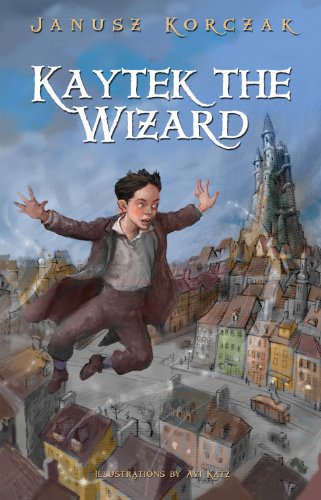B.J. Epstein delves into the magical world of Kaytek the Wizard by Janusz Korczak, recently translated into English by Antonia Lloyd-Jones.
Imagine a novel written in 1933 in Polish by an agnostic Jewish paediatrician, psychologist, and writer who later was to perish in Treblinka concentration camp along with the children from the orphanage he ran, though he was repeatedly offered sanctuary and special treatment, including by the Nazis themselves. This background is intriguing in and of itself.
But now also imagine that the author was inspired to write this book by a child who said that when he grew up he would like to be a wizard, though he knew he’d actually end up being a judge like his father. The novel is about a young boy who does in fact become a wizard, but finds that his actions are not always for good, and that he has serious responsibilities along with his amazing powers. As many critics have pointed out, this plot seems an obvious precursor to the Harry Potter series, except in this case Kaytek has no teachers and classmates to turn to and must learn these lessons for himself. In other words, it isn’t just the author who has a good story; Kaytek does too.
Though the author, Henryk Goldszmit, who wrote under the pen name of Janusz Korczak, was well known in Poland during his lifetime and appeared frequently on the radio and in other media, and though some of his works were translated to other languages (and his novel for children King Matt the First exists in English), Kaytek the Wizard has only just appeared in English, in a translation by Antonia Lloyd-Jones. She includes an interesting, detailed translator’s afterword with information on Korczak, who she describes as a ‘pioneer of children’s rights’, and about the history of the book.

by Janusz Korczak
(translated by Antonia Lloyd-Jones)
272 pp., New York: Penlight, 2012.
Antek, also known as Kaytek, which comes from a term for young boys, lives in Warsaw. He dreams of being a wizard or a sorcerer. ‘He wants to, and has to, know every single spell.’ Korczak writes that when he begins on the road to sorcery, ‘[f]rom then on Kaytek has two different lives. One is regular: at home, at school, and in the street. The other is different: his private, secret, inner life.’ This rich fantasy life is something many children can relate to, but what is perhaps not surprising to note is that in a sense, Kaytek’s two lives aren’t actually that different. He is curious and mischievous in both realms, and he has growing up to do as both a regular person and a wizard. But it is as a wizard that Kaytek causes the most damage, with accidents, fires, police, and more featuring in the story.
Korczak dedicated his novel ‘to all the restless children, those who find it hard to change and improve. You have to want to change, very much and very deeply. You need to strengthen your will power. You need to play a useful role in life.’ It is clear that this is the moral Korczak wanted his readers to take from this novel. Kaytek eventually does wish to be ‘a person’ and although he says this in the context of having changed into an insect, then an animal, then a bird, it can also be read as Kaytek wanting to be released from his powers. Whether he does in fact learn ‘will power’ and begin to follow the imperatives ‘Be alert! Be disciplined! Be brave’, is not completely clear, and the strength of this ambivalent ending is that it allows readers to reflect on their own responsibilities in life, just as Korczak seems to have wanted.
The English translation of Kaytek the Wizard was published by a new publisher and if this book is anything to go by, Penlight is one to watch.
Kaytek the Wizard is a moving story because of its plot but also because of its author’s history. It is a magical read.










